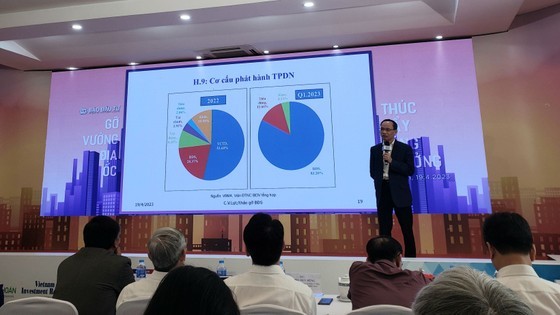 |
At the seminar |
According to experts in the realty and banking sectors, the market demand was only 20 percent - 30 percent compared with the same period last year in most segments.
The seminar participants also warned that credit growth, including capital inflows into the real estate market, had dropped sharply and showed no sign of recovery when it only reached 1.6 percent in the first quarter. In addition, bond maturity pressure is still very great, the total value of individual corporate bonds maturing in 2023 is estimated at VND235,000 billion, and about VND100,000 billion of real estate businesses’ bonds will come due.
In particular, the stagnation of the real estate market recently had the greatest impact on legal problems, accounting for 70 percent of the difficulties of projects. According to the Ministry of Construction’s information, about 400 projects in Hanoi and Ho Chi Minh City have been facing problems in project implementation procedures while the Vietnam Real Estate Association announced that in fact, this number is about 1,000 projects. These bottlenecks have lasted for many years but have not been resolved, the association said.
Experts commented that four new policies that directly or indirectly affect the real estate market were issued in the past month. Specifically, they are the Government’s Resolution No. 33/NQ-CP on a number of solutions to remove and promote the real estate market; the Decree 08/2023/ND-CP on offering and trading corporate bonds; the Prime Minister’s Decision No. 338/QD-TTg on approval of the project to build at least 1 million social housing in the 2021-2030 period; the Decree No. 10/2023 amending and supplementing a number of articles of decrees guiding the Land Law.
Regarding solutions for the real estate market in the coming time, economist Can Van Luc, a member of the National Monetary and Financial Policy Advisory Council, said that, first of all, management agencies should necessarily implement the newly issued policies to remove difficulties for the market as soon as possible.
In addition, management agencies need to continue to improve institutions to ensure synchronization and consistency among relevant laws. Moreover, responsible agencies should have clearer regulations in the grouping of real estate segments to have appropriate credit, capital and financial policies, said Mr. Luc.
He added that there should be guidelines to allow the establishment of specialized real estate financial institutions such as housing savings funds, social housing development funds, real estate investment trusts, real estate refinancing agencies housing mortgages, securitization of real estate in the long run as well as have an appropriate real estate tax schedule while promoting cashless payments with real estate transactions.
Economist Le Xuan Nghia, a member of the National Monetary and Financial Policy Advisory Council, suggested that during the process of restructuring the real estate market, it is crucial to prioritize bank credit capital for the housing recovery and development of affordable social housing creating a most decisive segment restructuring.
On the side of state management, local authorities should review land planning for the construction of affordable social housing to decisively resolve procedural issues for projects such as compensation payment, clearance, land use right tax valuation and bidding so that the projects can begin quickly.
























